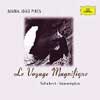Schubert Impromptus
View record and artist detailsRecord and Artist Details
Composer or Director: Franz Schubert
Label: DG
Magazine Review Date: 5/1998
Media Format: CD or Download
Media Runtime: 108
Mastering:
DDD
Catalogue Number: 457 550-2GH2

Tracks:
| Composition | Artist Credit |
|---|---|
| Impromptus |
Franz Schubert, Composer
Franz Schubert, Composer Maria João Pires, Piano |
| Allegretto |
Franz Schubert, Composer
Franz Schubert, Composer Maria João Pires, Piano |
Author: hfinch
This is something very special indeed. Maria Joao Pires’s two-disc set of Schubert’s Impromptus, significantly dedicated to Sviatoslav Richter, contains a booklet in which standard notes are replaced by carefully chosen extracts from Pires’s own reading: reflections on time, space and wilderness from Yves Simon’s Le voyageur magnifique; meditations on Schubert as Wanderer; and thoughts from a neuroscientist on the “physiology” of great music. Like so many prefaces, these words are best read afterwards, when certain fragments, different for each listener, may well close-focus in the mind elements still resonating in the ear. And in the spirit, too: for the neuroscientist’s words on great music apply equally to great performance – certainly as one recognizes it here.
Pires’s characteristic impassioned absorption in all she plays – that concentration which makes the listener appear to be eavesdropping on secrets shared between friends – could hardly find a truer soul mate than in the sensibility of Schubert. Each Impromptu has a rare sense of integrity and entirety, born of acute observation, long-pondered responses and, I sense, long wanderings throughout Schubert’s musical world at large.
To analyse such entirety is to reduce it: a reviewer can only point to certain manifestations. To Pires’s instinct for tempo and pacing, for instance, which brings a sense of constant restraint, a true molto moderato to the Allegro of the C minor work from D899, created by a fusion of right-hand tenuto here with momentary left-hand rubato there. Then there is the clarity of contour within the most subtly graded undertones of the G flat major of D899 which re-creates it as a seemingly endless song. Or an Andante just slow, just nonchalant enough for the Rosamunde theme of the D935 B flat major to give each variation space and breath enough to sing out its own sharply defined character.
The Allegretto, D915 acts as a Pause between the two discs, a resting place, as it were, for reflection and inner assessment on this long journey. Its end – which could as well be its beginning – is in the Drei Klavierstucke, D946 of 1828. The first draws back from the fiery impetuousness within the Allegro assai’s tautly controlled rhythms, to an inner world with its own time scale; the second, more transpired than played, has an almost unbearable poignancy of simplicity.
The paradox of these totally unselfregarding performances is how unmistakably they speak and sing out Pires and her unique musicianship. To draw comparisons here would be not so much odious as simply to miss the point.'
Pires’s characteristic impassioned absorption in all she plays – that concentration which makes the listener appear to be eavesdropping on secrets shared between friends – could hardly find a truer soul mate than in the sensibility of Schubert. Each Impromptu has a rare sense of integrity and entirety, born of acute observation, long-pondered responses and, I sense, long wanderings throughout Schubert’s musical world at large.
To analyse such entirety is to reduce it: a reviewer can only point to certain manifestations. To Pires’s instinct for tempo and pacing, for instance, which brings a sense of constant restraint, a true molto moderato to the Allegro of the C minor work from D899, created by a fusion of right-hand tenuto here with momentary left-hand rubato there. Then there is the clarity of contour within the most subtly graded undertones of the G flat major of D899 which re-creates it as a seemingly endless song. Or an Andante just slow, just nonchalant enough for the Rosamunde theme of the D935 B flat major to give each variation space and breath enough to sing out its own sharply defined character.
The Allegretto, D915 acts as a Pause between the two discs, a resting place, as it were, for reflection and inner assessment on this long journey. Its end – which could as well be its beginning – is in the Drei Klavierstucke, D946 of 1828. The first draws back from the fiery impetuousness within the Allegro assai’s tautly controlled rhythms, to an inner world with its own time scale; the second, more transpired than played, has an almost unbearable poignancy of simplicity.
The paradox of these totally unselfregarding performances is how unmistakably they speak and sing out Pires and her unique musicianship. To draw comparisons here would be not so much odious as simply to miss the point.'
Discover the world's largest classical music catalogue with Presto Music.

Gramophone Digital Club
- Digital Edition
- Digital Archive
- Reviews Database
- Full website access
From £8.75 / month
Subscribe
Gramophone Full Club
- Print Edition
- Digital Edition
- Digital Archive
- Reviews Database
- Full website access
From £11.00 / month
Subscribe
If you are a library, university or other organisation that would be interested in an institutional subscription to Gramophone please click here for further information.




